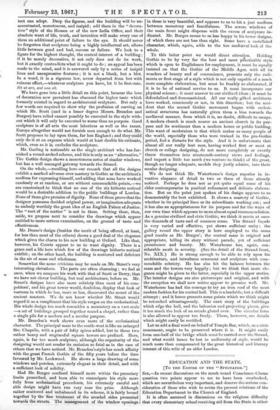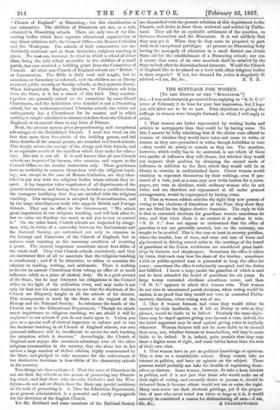EDUCATION AND THE STATE.
[To THE EDITOR OF THE "SPECTATOR."] Sui,—In recent discussions on the much vexed Conscience-Clause question two points appear to me to have been overlooked, which are nevertheless very important, and deserve the serious con- sideration of those who wish to revise the present relations of the Education Department to the Church of England.
It is often assumed in discussions on the religious difficulty that every elementary school receiving aid from the State is either "Church of England" or Dissenting ; but this classification is not exhaustive. The children of Dissenters are not, as a rule, educated in Dissenting schools. There are only two of the Dis- senting bodies which have separate educational organization or any direct relations with the Council Office—the Roman Catholics and the Wesleyans. The schools of both communities are un- doubtedly sectional, and in them distinctive religious teaching is given. No cam can, however, be cited in which a school of either class, being the only school accessible to the children of a small parish, has ever received a building grant from the Committee of Council. All other non-Church of England schools are " British" or Lancasterian. The Bible is daily read and taught, but no catechism or formulary is enforced, and the children are at liberty to attend public worship or Sunday schools, as their parents choose. When Independents, Baptists, Quakers, or Unitarians ask help from the State, it is for a school of this kind. They combine together, are generally joined on the committee by some liberal Churchmen, and the institution thus founded is not a Dissenting school, but an undenominational Christian school, one which not unfrequently has a Churchman for its master, and in which nothing is taught calculated to alienate scholars from the Church of England, or to convert them to any form of Dissent.
Next, the present system gives preponderating and exceptional advantages to the Established Church. I need not dwell on the fact that more than five-sixths of the building grants, and full three-fourths of the annual grants, are awarded to Church schools. This simply attests the energy of the clergy and their friends, and is an equitable result of the sacrifices which they make for educa- tion. But this is not all. It is well known that all non-Church schools are inspected by laymen, who examine and report to the Council Office on the secular instruction only. These gentlemen have no autholity to concern themselves with the religious teach- ing; nor, except in the case of Roman Catholics, are they-iden- tified in any way with the religious bodies whose schools they in- spect. A lay inspector takes cognizance of all departments of the general instruction, and having done so, he takes a certificate from the managers testifying that they are satisfied with the religious teaching. This arrangement is accepted by Nonconformists, and by the large miscellaneous body who support British and Foreign Schools. They say in effect to the Government, "We attach great importance to our religious teaching, and will look after it ; but we value our freedom too much to ask you to test or control it." On the other hand, Church schools are inspected by clergy- men, who, in virtue of a concordat between the Government and the National Society, are authorized not only to examine in the Liturgy and Catechism of the Church of England, but to enforce such teaching as the necessary condition of receiving a grant. The clerical inspectors constitute about four-fifths of the whole staff. They visit Church schools exclusively, and they are instructed first of all to ascertain that the religious teaching is satisfactory ; and if it be otherwise, to refuse to examine the scholars in reading, writing, and arithmetic. There is nothing to hinder an earnest Churchman from taking an office of so much influence solely as a piece of clerical duty. He is a paid servant of the State, but he may interpret his obligations to the Council Office in the light of his ordination vows, and may make it not only his first but his main business to see that the doctrines of the Church are diligently taught in all the schools of his district. This arrangement is made by the State at the request of the Bishops and the National Society. In substance the heads of the Church say to the Educational Department, "Though we attach much importance to religious teaching, we are afraid it will be neglected in our schools if you do not insist upon it. Unless you give as a special staff of clerical inspectors to enforce and to test the doctrinal teaching in all Church of England schools, our own personal influence will be insufficient to secure for such teaching the attention which it deserves." Accordingly, the Church of England now enjoys this enormous advantage over all the other religious communities in the country, that she alone has in her service a large number of skilled officials, highly remunerated by the State, and pledged to take measures for the enforcement of her distinctive doctrines in four-fifths of the elementary schools in the country.
Two things are thus evident-1. That the mass of Dissenters do not use their day schools as the means of promoting any Dissent- ing creed; and that those who do—the Catholics and the Wes- leyans—do not ask or obtain from the State any special assistance in the task of promoting it. 2. That the Education Department, as at present administered, is a powerful and costly propaganda for the doctrines of the English Church.
Yet Mr. Hubbard and some members of the National Society
are dissatisfied with the present relations of this department to the Church, and desire to have them reviewed and settled by Parlia- ment. They ask for an equitable settlement of the question, as between themselves and the Dissenters. It is not unlikely that they may get it. When they do they must be prepared to part with their exceptional privileges. At present no Dissenting body having the monopoly of education in a small district can obtain State aid for the establishment of a Dissenting school; nor can it secure that some of its own members shall be salaried by the State to look after its denominational interests. Would the Church of England like to be placed on a level with other religious bodies in these respects? If not, her demand for justice is singularly ill































 Previous page
Previous page